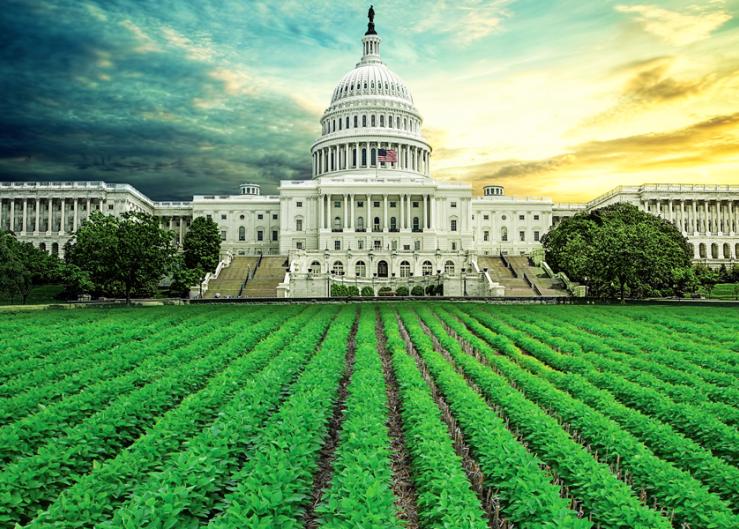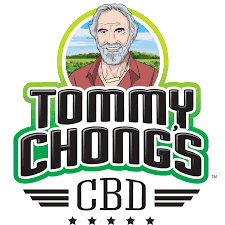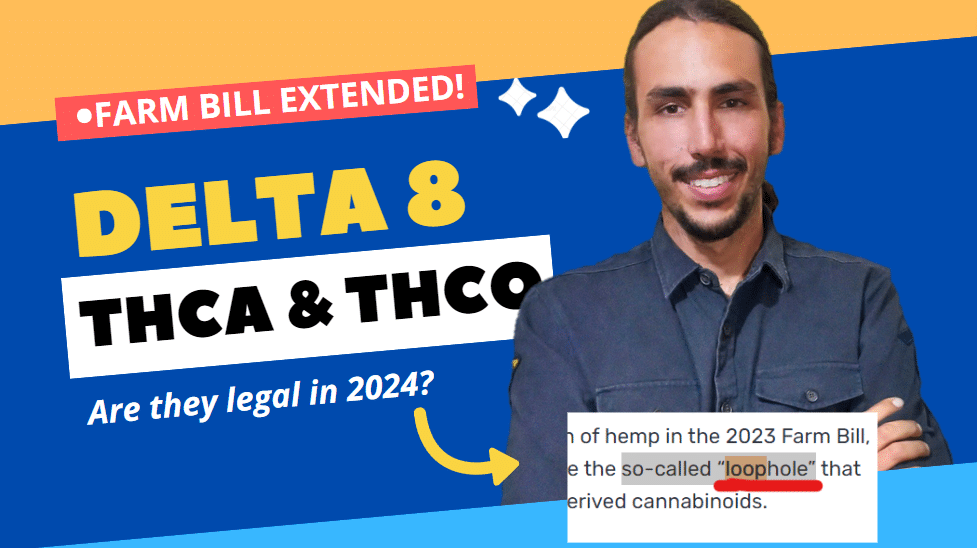The cannabis industry is constantly evolving, with new products, markets, and regulations emerging every year. One of the most significant developments in recent years was the passage of the 2018 farm bill, which legalized hemp and its derivatives at the federal level, opening the door for a booming hemp industry. The Farm Bill 2024 extension has sent shockwaves through the industry, as many were hoping that Congress would close what has been determined to be a “loophole.” to sell hemp-derived products.
While the initial focus was on CBD, the most abundant and well-known cannabinoid in hemp, other derivatives soon gained popularity, such as Delta 8, THCa, and THCo. These compounds offer different effects and benefits than CBD, attracting consumers who are looking for alternative ways to experience cannabis.
But what is the legal status of these cannabinoid derivatives in 2024? And how does the farm bill 2024 extension affect the cannabis industry? Below, we will explore these questions and more, with insights from a cannabis industry expert and SEO specialist who has helped clients rank for keywords related to THC gummies and cannabinoid products.
>> Schedule a free cannabis site audit & marketing action plan
What are Delta 8, THCa, and THCo?
Before we dive into the legal aspects, let’s first understand what these cannabinoid derivatives are and why they are important for the cannabis industry.
Delta Products
Delta 8 is a minor cannabinoid that occurs naturally in hemp, but in very low concentrations. It is similar to Delta 9, the main psychoactive compound in marijuana, but with less potency and fewer side effects. Delta 8 can produce a mild high, along with anti-inflammatory, anti-nausea, and pain-relieving properties. It can also enhance mood, appetite, and creativity.
THCa, THCo, and So On!
THCa is the acidic precursor of THC, which means it is the form that THC takes before it is heated or exposed to light. It is non-psychoactive, but it has anti-inflammatory, neuroprotective, and anti-convulsant effects. It can also modulate the immune system and reduce nausea and vomiting.
THCo is a synthetic cannabinoid that is created by adding an acetate group to THC. This process increases the potency and bioavailability of THC, making it more effective and longer-lasting. THCo can produce a strong high, along with euphoria, relaxation, and sedation. It can also stimulate appetite, relieve pain, and reduce inflammation.
These cannabinoid derivatives offer a range of benefits and experiences for consumers, expanding the diversity and appeal of the cannabis industry. They also create new opportunities and challenges for cannabis businesses, especially in terms of legal compliance and marketing.
>> Schedule a free cannabis site audit & marketing action plan
How Does the Farm Bill 2024 Extension Affect the Legality of Delta, CBD & Other Cannabinoid Derivatives?

The 2018 farm bill was set to expire in 2023, which would have required Congress to pass a new legislation to regulate hemp and its derivatives. However, due to a potential government shutdown and the political gridlock, Congress decided to extend the current farm bill until 2024, giving the hemp industry more time to operate under the existing rules.
This extension may seem like good news for the cannabis industry, as it provides more stability and certainty for hemp businesses. However, it also creates some legal loopholes and ambiguities that could pose risks for cannabinoid derivative vendors.
According to legal groups such as MGLINY, the farm bill 2024 extension does not explicitly address the legality of cannabinoid derivatives, leaving it up to the interpretation of the DEA, the FDA, and the states. While the farm bill defines hemp as any part of the cannabis plant with less than 0.3% Delta 9 THC, it does not specify how to measure or regulate other cannabinoids, such as Delta 8, THCa, and THCo.
>> Schedule a free cannabis site audit & marketing action plan
This means that these cannabinoid derivatives could be considered legal, illegal, or somewhere in between, depending on how they are derived, processed, tested, and sold. For example, Delta 8 could be legal if it is extracted from hemp, but illegal if it is synthesized from CBD. THCa could be legal if it is naturally occurring in hemp, but illegal if it is converted to THC. THCo could be illegal if it is considered a controlled substance analogue, but legal if it is derived from hemp.
These legal uncertainties create a complex and dynamic situation for cannabinoid derivative vendors, who have to navigate the federal, state, and local laws, as well as the enforcement and oversight of various agencies. While some states have explicitly legalized or banned these cannabinoid derivatives, others have vague or conflicting regulations, making it difficult for vendors to comply and avoid legal troubles.
Farm Bill 2024: Does the Cannabis Legislation Trend Affect the Cannabinoid Derivative Market?

Despite the legal challenges, the cannabinoid derivative market is growing rapidly, thanks to the increasing demand and awareness of consumers, as well as the favorable trends in cannabis legislation. In 2024, the executive branch announced that it would support the decriminalization of non-violent marijuana possession offenses, signaling a shift in the federal stance on cannabis.
This move could pave the way for more reforms and progress in the cannabis industry, such as the rescheduling or descheduling of marijuana, the legalization of medical and recreational cannabis, and the expansion of research and development.
>> Schedule a free cannabis site audit & marketing action plan
These trends create opportunities for cannabinoid derivative vendors to leverage the legal ambiguities and explore new markets. By offering products that are different from the mainstream CBD and THC, vendors can attract consumers who are looking for variety, novelty, and quality. By following the best practices and guidelines for legal compliance, vendors can also avoid potential pitfalls and penalties.
Samuel Fisher, a cannabis industry expert and SEO specialist, has helped clients rank for keywords related to THC gummies and cannabinoid products, such as “best THC gummies”, “Delta 8 gummies”, and “THCo gummies”. He has also helped clients sell these products nationally, using strategic methods and tools to optimize their online presence and visibility.
How to Use Parasite SEO to Boost your CBD & Delta Business?
One of the methods that Samuel Fisher uses to help his clients is parasite SEO, which is a strategic approach to boost online visibility and rankings for cannabis-related content. Parasite SEO involves creating and hosting content on high-authority websites that already rank well on search engines. By using these websites as “parasites,” you can benefit from their domain authority, traffic, and trust, and drive more visitors to your own website or store.
Parasite SEO can be very effective for cannabinoid derivative businesses, as it can help them overcome the challenges and limitations of traditional SEO, such as:
- High competition: The cannabis industry is highly competitive, with thousands of websites and businesses vying for the same keywords and customers. By using parasite SEO, you can bypass the competition and rank higher on search engines, as you are piggybacking on the authority and popularity of the parasite websites.
- Low authority: The cannabis industry is relatively new and niche, which means that many websites and businesses lack the authority and credibility to rank well on search engines. By using parasite SEO, you can leverage the authority and reputation of the parasite websites, which are already trusted and recognized by search engines and users.
- Strict regulations: The cannabis industry is subject to strict regulations and restrictions, which can affect the SEO performance and visibility of websites and businesses. For example, many cannabis websites and businesses cannot use paid advertising, such as Google Ads or Facebook Ads, to promote their products and services. By using parasite SEO, you can avoid these regulations and restrictions, as you are using the parasite websites as platforms to host and distribute your content.
>> Schedule a free cannabis site audit & marketing action plan
Tips For Setting Up Your Own Parasite SEO Store

To set up a parasite SEO store, you need to follow these steps:
- Choose a parasite website that is relevant, popular, and authoritative for your niche and target audience. For example, if you are selling THC gummies, you can choose Medium, Quora, or Reddit, as these websites have a large and engaged audience of cannabis enthusiasts and consumers.
- Create an account and a profile on the parasite website, using your brand name, logo, and bio. Make sure to include a link to your website or store, as well as a call-to-action to encourage visitors to check out your products and services.
- Create and publish high-quality content on the parasite website, using keywords, topics, and formats that are relevant and appealing for your niche and target audience. For example, if you are selling THC gummies, you can create and publish articles, reviews, guides, or videos about the benefits, effects, and experiences of THC gummies, using keywords such as “best THC gummies”, “Delta 8 gummies”, or “THCo gummies”.
- Optimize and promote your content on the parasite website, using SEO techniques and strategies to improve your rankings and visibility on search engines. For example, you can use title tags, meta descriptions, headings, images, links, and keywords to optimize your content, and use social media, email, or influencer marketing to promote your content.
- Monitor and measure your results, using analytics tools and metrics to track and evaluate your performance and progress. For example, you can use Google Analytics, Google Search Console, or SimilarWeb to monitor and measure your traffic, conversions, and revenue.
By using parasite SEO, you can boost your online presence and visibility, and drive more traffic, leads, and sales to your cannabinoid derivative business to leverage the farm bill 2024 extension.
>> Schedule a free cannabis site audit & marketing action plan
Need Some Help With SEO in the Cannabis Industry?

Samuel Fisher is a cannabis industry and SEO expert who has helped clients rank for keywords related to THC gummies and cannabinoid products, such as “best THC gummies,” “Delta 8 gummies,” and “marijuana seeds.” He has also helped clients sell these products nationally, using strategic methods and tools to optimize their online presence and visibility.
Samuel Fisher has over 10 years of experience in the cannabis industry, working with various businesses, brands, and influencers, such as Tommy Chong, one of the most famous and influential figures in the cannabis culture. He has also over 15 years of experience in SEO.
>> Schedule a free cannabis site audit & marketing action plan

